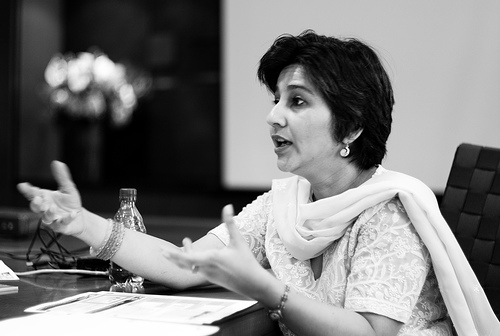 Not so long ago photographs were published revealing to the world how TV cook and cookbook author Nigella Lawson’s husband Charles Saatchi took hold of the chef by her throat at a public restaurant. The incident was captured by the paparazzi and has created a frenzy of mixed opinions in social media. We ask ourselves, such a strong, independent woman like Nigella, why doesn’t she just leave?
Not so long ago photographs were published revealing to the world how TV cook and cookbook author Nigella Lawson’s husband Charles Saatchi took hold of the chef by her throat at a public restaurant. The incident was captured by the paparazzi and has created a frenzy of mixed opinions in social media. We ask ourselves, such a strong, independent woman like Nigella, why doesn’t she just leave?
Malika Dutt is the founder of human rights organisation BreakThrough. In the newspaper Dagens Nyheter there was a translated debate article earlier published in The Hindu, in it she wrote about the problem with the question we tend to ask the victim.
“By asking why she doesn’t leave, we are in fact continuing to blame the battered woman for the violence in her life. In this case, because she’s successful and financially independent, we are implying that it is still Nigella’s fault that she’s getting abused because she chooses to stay. So while it’s understandable to ask, “Why does she stay with such a jerk?” those questions are also symptomatic of a culture that routinely excuses this type of violence and places the burden on the woman. Instead, we really need to ask ourselves two far more important questions: Why was Saatchi choking his wife in the first place? And why didn’t anyone intervene? The key question must be why do men commit so much violence against women? And when they do, why does society continue to allow it?”
It is therefore the woman’s responsibility to make sure she does not get abused, not the man’s responsibility to stop abusing. The same blame rhetoric is placed on women who have become victims for prostitution and trafficking. It is the prostitute that should stop selling her body, not the buyer that should stop exploiting another human being. And if she is threatened, if she is assaulted or raped then it is also the woman’s own fault, because she has put herself in harm’s way, because she did not leave.
“But, more to the point, we need to shift the question and the responsibility to the abuser in the equation. If we excuse and diminish the role of the abuser, we excuse and diminish his responsibility. We give a pass to him and, beyond that, to the limiting, damaging culture of masculinity — what it “means” to be a “man” — that devalues women and men and makes violence inevitable,” Writes Marika Dutt.
Photo www.asiancemagazine.com


